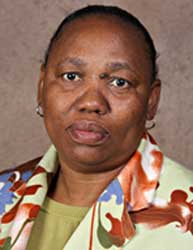SA runs the risk of becoming "dangerously elitist" and of "throwing away" half of its young people that fail to get at least 50% in matric examinations‚ Higher Education and Training Minister Blade Nzimande said.

Blade Nzimande says 30% is sufficient to equip a student for further education and training. Image: GCIS
At a media briefing to outline the opportunities for matriculants in the post-school education and training system‚ Nzimande defended the 30% pass mark and said that this benchmark meant that pupils had acquired the "necessary competencies" to be able to follow a higher certificate in a particular area‚ for example hospitality.
The debate on the 30% pass mark in SA has been raging for some time now and inevitably has come up again following the release of the 2013 matric results earlier this week.
At present‚ students must get at least 40% in languages and maths‚ and 30% in their other subjects‚ to pass matric.
Last year the Department of Basic Education ran advertisements in several newspapers calling for public comment on whether the 30% minimum pass mark was adequate in terms of equipping pupils for success in higher education and the workplace.
Public comment on pass rates
The call for the public comment came after the appointment earlier last year of a ministerial committee to consider the pass mark.
Nzimande said that focusing solely on pupils who only achieve 50% would mean that those who achieved less would be thrown into the "dustbin". He said pupils could not qualify for University with a 30% pass.
"Our philosophy as a country is that there is no dustbin where living human beings can be thrown into because they have failed‚" Nzimande said.
"As the Department of Higher Education we want to say officially: You who have got 20% we want you‚ to give you opportunities and a chance to have a living that is what we are doing. The president has said no person must be able to say I do not know where to go to acquire a skill‚" Nzimande said.

With a 30% pass rate, students do not know 70% of what they should have learned. Image: Jacek Fulawka
Fotolia"We are satisfied that the quality of the education system we are building will compare well with the rest of the world. We may not be there as yet because of the huge challenges that we have and the inequalities we inherited from apartheid. Our universities are still highly uneven and those are issues that are impacting on quality not the benchmark‚" Nzimande said.
Basic Education Minister Angie Motshekga announced earlier this week a 78.2% pass rate for the 2013 matric class was the highest since the dawn of democracy.
Numbers artificially inflated
However a number of observers and critics have said that the numbers were artificially inflated through low standards and pupils were not equipped for higher education‚ training or work.
Nzimande announced at the media briefing that 96‚449 opportunities are available to matriculants within the post-school education and training system at 25 universities‚ 50 Further Education and Training (FET) Colleges and 21 Sector Education and Training Authorities (SETAs).
Nzimande said that the department was working hard to diversity and expand the post-school education and training system so that it moves away from a university-based post education and training system.
"As government we are deliberately expanding the FET sector. We need to have an FET sector which is at least three times bigger than universities in order to absorb learners coming into the system‚" the minister said.
DA comes up with different figures

Basic Education Minister Angi Mothshega is very pleased with the matric pass rate this year
Meanwhile‚ the Democratic Alliance (DA) said that according to available figures‚ if a calculation was done by dividing the number of learners who passed matric over the number of Grade 10 learners who attended public schools in 2011‚ the "real" national pass rate for 2013 works out to 41.7% rather than 78.2%.
This drastically changes the "real" pass rates for provinces as follows: Western Cape‚ 55.3%; Gauteng‚ 49.4%; KwaZulu-Natal‚ 44.8%; Mpumalanga‚ 41.9%; Free State‚ 39.5%; North West‚ 38%; Northern Cape‚ 36.6%; Limpopo‚ 34.1%; and Eastern Cape‚ 32.3%.
"It is worrying that both the Free State and the North West‚ which scored pass rates of 87.4% and 87.2% have high drop-out rates‚" said DA Basic Education spokesman Annette Lovemore.
"According to a report‚ a massive 56.5% of learners in the North West and 54.8% in the Free State dropped out between Grade 10 and 12.
"The question that arises is‚ are provinces deliberately ignoring the problem of high drop-out rates in an effort to "up" their matric pass rates?"
Lovemore said that SA could not continue to use the matric pass rate as the major indicator of the state of the education system.
"We are concerned that learners' futures are being undermined to improve pass rates. The focus needs to be on improving retention rates and the quality of education offered. Our learners must be able to pass matric confidently and have a solid understanding of key concepts in various subjects that will enable them to pursue higher education opportunities‚" Lovemore said.








































